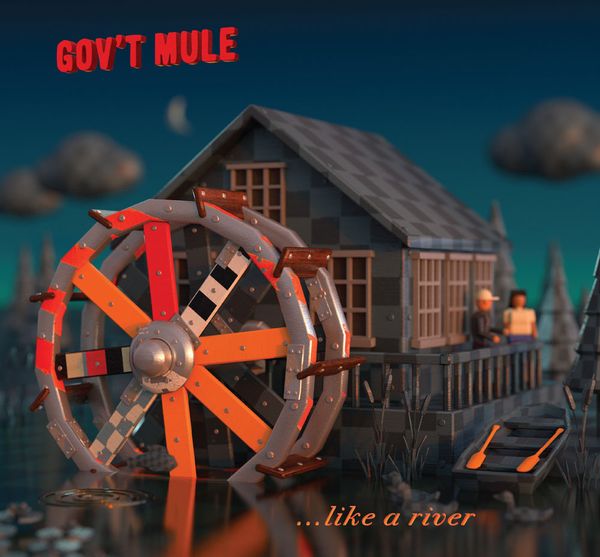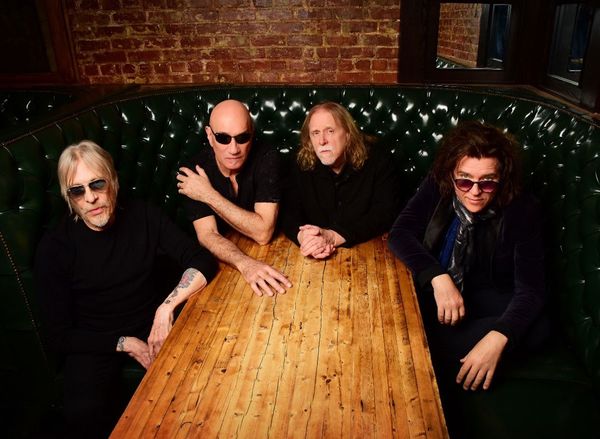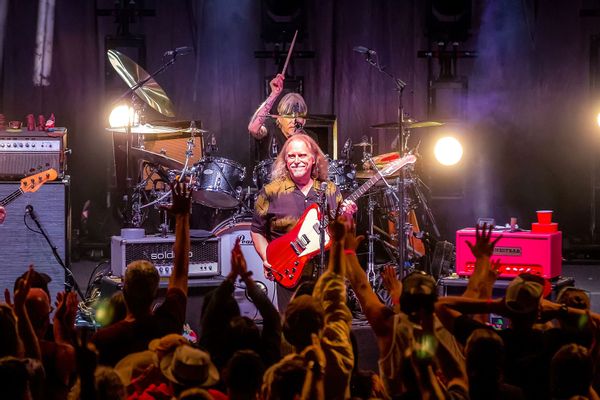
Warren Haynes is one of the greatest practitioners of rock and roll in the history of the artform. He consistently ranks on "best guitarist" lists, playing with a hard rock intensity and jazz-like virtuosity. At the same time, he amplifies a deep, soulful voice, enabling him to cover everything from Led Zeppelin to Otis Redding.
"I made a conscious effort to bring back the concept of more complex song arrangements."
Over the past 35 years, Haynes has channeled his sizable skills into the creation of an unrivaled resume: He was in the Allman Brothers Band for 25 years, he toured with The Dead, and most significantly, he and the late bassist Allen Woody, who was also in the Allman Brothers, founded Gov't Mule in 1994. With drummer Matt Abts, Mule's intention was to make one record and tour behind it as a side project. Things did not go according to plan. Gov't Mule has never stopped making records and touring the world. They are a staple of the jam scene, and like the Grateful Dead and The Allman Brothers, play unpredictable shows full of improvisation and surprise set choices. Planting a flag in their own territory, they manage to combine the influences of Black Sabbath and Ray Charles into one cohesive presentation.
They are currently touring to support their new record, "Peace . . . Like a River," a diverse collection of lively and intricate songs. Taking a dip in the rivers of soul, gospel, jazz, blues and rock and roll, Gov't Mule's new songs navigate the search for inner peace, as well as the fight for peace and justice in American politics. "Same As It Ever Was" and the 10-minute epic "Made My Peace" give complex aural summary of self-discovery, taking listeners down many musical twists and turns. "Dreaming Out Loud," with lyrics heavily inspired by the speeches of Dr. Martin Luther King, President John F. Kennedy, Robert F. Kennedy (Sr.) and John Lewis, enlists guest vocalists, Ruthie Foster and Ivan Neville, to cry out for racial harmony, while "Long Time Coming" celebrates recent protest movements for racial and environmental justice.
"Peace . . . Like a River" is a riveting record, demonstrating Gov't Mule's quest to challenge themselves and their audience with music that is as soulful as it is imaginative.
I recently interviewed Warren Haynes, lead singer, guitarist, and songwriter for Mule about the new record, changes in mainstream music culture, and the band's upcoming tour, "Dark Side of the Mule," which will feature a set paying tribute to Pink Floyd.

Well, it all starts with the writing process. During COVID, when we were all in our houses, I had so much time to write that I had more new material than I've had in a long time. I made a conscious effort to bring back the concept of more complex song arrangements. I was thinking of some of our early stuff, like "Left Coast Groovies," and some of our songs that have many moving parts. But more importantly, I was thinking about sounds that have influenced us that have many moving parts. All of our favorite stuff from the late '60s and early '70s didn't adhere to the modern-day formula of verse-chorus-verse-chorus. Some of the songs, instead of having two or three sections, would have seven or eight. They'd have tempo changes and key changes. And I thought it might be nice to bring that back – more intricate arrangements. The first four songs on this record really portray that. "Same as It Ever Was," "Shake Our Way Out," "Made My Peace" and "Peace I Need" are all good examples of challenging the modern-day short attention span.
When you wrote some of those songs, you composed the complex arrangements? It wasn't something that came out of the recording?
Yes, for the most part I wrote the songs that way. Some things changed when we got into recording, but I went into the songs with the mindset of not limiting myself. During the whole lockdown, a lot of the songs that I wrote, I'd write on a guitar, and get all these ideas for different sections and parts, and record them, sometimes, on my phone, just so I would not forget them when we got into rehearsal. I had not had that kind of time in so many years that it was great to think that way.
So it was a silver lining in an otherwise terrible circumstance?
Yeah. Absolutely.
You mentioned "shot attention span." Why do you think that mainstream music culture has changed from the time when a sprawling epic with a complex arrangement could get on the radio to now you almost never hear that, and often the songs that you do hear are two minutes and 30 seconds with the same loop repeated over and over? What do you think accounts for that change?
It is a combination of a lot of things. Technology always helps dictate those kind of negative changes, negative in my mind. But also it is up to the artists and musicians to fly in the face of the trends. I made a joke with someone recently that if songs get any shorter, they won't even have a verse. They'll be nothing but a chorus. I think back to songs like "Band On the Run" or "Bohemian Rapsody" or "Roundabout," even the radio versions of those songs had so many moving parts, and for whatever reason, people didn't have trouble following it. It was interesting and it maintained your attention. There was no reason to question it, because it was exciting and creative. I'd like to see the music world get back to that, because individuals as music lovers, as long as something is exciting, they're not going to be bothered by something conflicting with the norms and modern-day approach. People who really love music always embrace something that it is new, different and fresh.
And welcome the surprise.
Yes, I remember many of the songs that I loved, I loved because I could hear how different they were from the songs surrounding them.
When you attribute many "negative changes" to technology, would you draw a connection between shorter and more repetitive songs and fewer entertainers playing instruments?
Those things are definitely tied together. We're starting to see more young people playing instruments and pursuing live performance. I'm hoping that it is a sign of a backlash against what Gov't Mule is rebelling against. You can see when you get on a plane, and it lands, everyone on the plane is looking at their phone. Some of them have legitimate reasons, but others are just jonesing. I remember when cell phones first became in vogue, you would see a person walking down the street on the phone, and everyone would mock him as someone drawing attention to himself. Now, everyone is on their phone.
That reminds me of the late Senator Danial Patrick Moynihan's phrase, "Defining deviancy down."
That's right. I feel like the powers that be have become content to market to the lowest common denominator. Maybe that's always been the case, but it was, at least, to a lesser extent. There's not a lot of focus on music that enlightens people, and that carries over to other products as well.
Something else that jumped out about the new record, especially in comparison to your 2017 record "Revolution Come . . . Revolution Go," which was angrier, is that it has a hopeful quality and mood. Is that feeling something you set out to inject into the songs?
"Rock and roll music has always reflected the times, and we're in some pretty precarious times."
Yeah, I did not want to write depressing, COVID-centric songs. I wanted to think about what was important in life, based on all the challenges we were going through. What would remain important? What could we let go of? It wasn't so much a conscious effort as it was what I found myself doing as I was writing. However, I did make sure not to write or record an album that was about how depressed we felt during COVID. There are songs like "Shake Our Way Out" and "Head Full of Thunder" that are definitely coming from a sense of humor sort of angle. All the ones that tie together, like "After the Storm," "Same As It Ever Was," and "Peace I Need," are all exploring different aspects of an individual's search for inner peace.

At the same time there are some political anthems like "Dreaming Out Loud" and "Long Time Coming." Did you want to issue a comment on the various political crises? More broadly, why do consistently write protest songs? Every Mule record has, at least, one or two.
Rock and roll music has always reflected the times, and we're in some pretty precarious times. To ignore that is definitely the wrong thing. "Revolution Come . . . Revolution Go" was started, at least in the recording process, on election day of 2016, which forced us into a certain mindset. Here we are, years later, in a different predicament, but obviously America and the world in general are facing many challenges. I wanted to touch on those challenges in a few songs, but focus more on what we are all feeling together. Even though many of these songs are about my personal journey, I think they relate well to others, because during COVID, for the first time in my lifetime, everyone was facing the same fears and challenges.
Relating to what you said earlier about music culture, what would you say has become of the album itself as a vehicle of music now that streaming has become the dominant listening format?
It's never going to be palatable for me to think of our audience only listening one track at a time. Right or wrong, I feel like we owe it to ourselves and our audience to put albums together with a thoughtful sequence and artwork that reflects the music. We want to keep that spirt alive. In some ways, that concept is coming back. Vinyl is outselling CDs now. It can't compare with streaming, but even many in the younger generation are excited about vinyl, and many young listeners are starting to get the concept of sequencing a record and why that is important. The instant gratification part of the equation, though, is that someone always has access to the feature track, and is going to start there. But many of our fans don't adhere to that mindset, and they look at music exactly the way we do.
As a writer, I often think of an album like I do a great book. You can pull a passage or chapter out of the book, and have a great reading experience, but nothing compares to reading the book in completion, and seeing how different parts interact and build off each other.
Right, and for no other reason to get a glimpse into what the artist or the band was thinking in addition to the one featured track during that time period. It helps to know what else was going on in someone's mind other than one important thought that they had. Even if there was no concept to the record, a lot of our favorite records had songs that connected to each other because they developed in a single period during the artist or band's life.
"Pink Floyd's music is a good example of predicting what was to come."
I would assume that one of your favorite records is Pink Floyd's "Dark Side of the Moon" because you are getting ready for a "Dark Side of the Mule" tour this summer in which you'll play a Pink Floyd set every night. Why that particular record and why Pink Floyd for a tribute tour?
For us, "Dark Side of the Mule" is license to play anything from Pink Floyd we'd like, not only "Dark Side of the Moon." Although, we do borrow heavily from that record. The fact that the 50th anniversary of that album is upon us is the impetus for doing the tour one last time. It is one of my favorite records. It is musically fantastic, and in some ways, better now than it was when it first came out. That's really the test of music. Is it timeless? Does it hold up in a modern light, in modern society? All the records that are our favorites do hold up, and allow us to learn something now that we didn't discover at its release. Pink Floyd's music is a good example of predicting what was to come.
What are some of the other records that you would put alongside "Dark Side of the Moon"?
There's so many. All my favorite Led Zeppelin records, Little Feat records, Steely Dan records. Some of the great singer/songwriter records, like James Taylor's "Mud Slide Slim and the Blue Horizon," Jackson Browne's early records, Dylan's early records. I'm only scratching the surface. We won't even go into blues and jazz. In the blues and jazz world, from 1955 to 1965, there was an unbelievable flood of great music that stretched into the '70s. With rock and roll, from around 1966 or '67 to about 1973, there was just an amazing amount of classic, timeless music. I'm not sure why that was, but the soul music world was the same. If you look at the Marvin Gaye records, the Sly and the Family Stone records, and the Stevie Wonder records in that time period, they all have a timeless quality to them. When you hear them now, it doesn't feel like they were trying to copy anything. They weren't compromising or selling out. They were making music at the highest level possible for them.
This is a little tangential, but speaking of Pink Floyd, do you have any thoughts on the recent controversies surrounding Roger Waters?
I don't really have any comment on that. I think Roger is one of the great songwriters of our time, and he has very strong political views – some that I agree with and some that I don't. But it doesn't change the music. I don't see any reason to shy away from the music, because he's controversial.

The parameters of the jam world are loose and basic. The only real requirement is that you leave some of your songs open for reinterpretation on a nightly basis so that improvisation plays an important part in what you are doing. You play a different setlist night to night, rather than repeating that same set for the entire tour. You should include some strange cover choices, but also some obvious cover choices. There really aren't any strict musical rules. I've said for over 10 years that the jam world should incorporate more jazz, more reggae and more bluegrass, and it is finally starting to happen.
Gov't Mule is kind of the bastard child of the jam scene – the black sheep – because we're heavier than other jam bands. But we're still steeped in improvisation. It is interesting, because when we go to Europe, they don't have the same understanding and appreciation of the jam band scene. Some people are starting to get it, but the reason we do well in Europe, is they look at us as a rock and roll band – the same way they might look at The Black Crowes. In other parts of the world, they haven't really fully gotten into what the jam scene is all about, and that's understandable, because it is a bit bizarre. But, if you are open-minded as a music lover, I would suggest that you will realize it has something to offer.
So many rock and roll legends have died recently. You often write thoughtful tributes on your social media when a legend dies. How do you assess the legacy and meaning of rock and roll, as this is happening?
It is a bit scary that so many of the people that created the music we fell in love with are no longer with us. I would like to think that the timelessness, importance and integrity of it will inspire people to keep it alive. I hope that people realize the difference between trendy music and timeless music. There is always a place for pop music, but there's always a place for music that aspires to go beyond that, and to offer music lovers something much more challenging and inspired.
And after writing songs about the search for inner peace, how would you say that experience changed your approach to making music?
I feel like we're in the beginning of a new chapter. There's a lot of inspiration right now. We all should feel liberated. Personally, we're thankful for our chemistry as a band, and thankful for the opportunity to do what we love.







